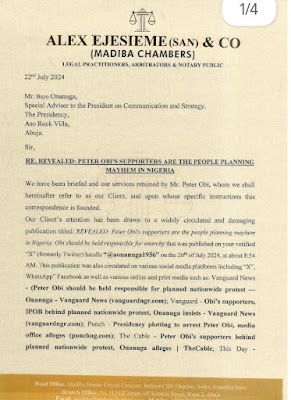Peter Obi Demands Apology and N5 Billion in Damages from Presidential Aide Onanuga
Alleged Defamation: Peter Obi Demands Apology and N5 Billion in Damages from Presidential Aide Onanuga
In the ever-evolving political landscape of Nigeria, controversies and allegations often make headlines, shaping the narrative of public figures. One such incident recently emerged involving Peter Obi, a prominent political figure and former governor of Anambra State, and presidential aide, Onanuga. The situation escalated into a serious legal confrontation after Obi accused Onanuga of defamation, demanding an apology within 72 hours and a significant financial compensation. In this article, we will dive deep into the details of this case, explore the concept of defamation, and discuss the implications of such legal battles for public figures.
Peter Obi's legal team recently issued a statement demanding that Onanuga, a well-known media personality and presidential aide, issue a public apology. According to Obi, Onanuga made several defamatory statements about him that could potentially harm his reputation. These remarks, which have not been fully disclosed to the public, allegedly targeted Obi's character and integrity, raising serious concerns regarding his public image.
The 72-hour ultimatum given to Onanuga is a direct response to these allegations, emphasizing the gravity of the situation. Obi's legal team has also demanded N5 billion in damages, a figure that underscores the seriousness of the claim and the potential financial consequences of defamation.
When someone feels their reputation has been damaged through defamatory remarks, they often pursue legal action to restore their good name. The first step in a defamation case typically involves sending a legal notice or demand letter, which serves as a formal request for retraction or apology. This step aims to resolve the issue amicably without involving the courts.
In Obi's case, the demand for an apology and the substantial financial compensation indicates that he seeks both public acknowledgment of the false statements and compensation for the damage caused. If Onanuga fails to comply with the 72-hour deadline, the matter is likely to escalate to a court of law, where both parties will present their arguments and evidence.
Implications for Peter Obi's Political Career
For Peter Obi, this defamation case has significant implications for his political career. As a presidential candidate and former governor, his image is crucial for maintaining public trust and support. Any negative statements or attacks on his reputation could sway public opinion, especially in an era where social media plays a key role in shaping perceptions.
By pursuing legal action, Obi not only aims to protect his personal reputation but also to send a message that defamatory attacks will not be tolerated. It also highlights the importance of safeguarding the integrity of public figures, particularly in the cutthroat world of politics.
Onanuga's Response and the Importance of Reputation Management
Onanuga, on the other hand, is now faced with a legal battle that could significantly affect his own reputation. As a presidential aide, he is in a position of influence, and any allegations of defamation can undermine his professional standing. If he fails to issue an apology or resolve the matter amicably, the public perception of his credibility and trustworthiness may be damaged.
Reputation management has become a critical aspect of modern-day public relations, especially for individuals in the public eye. Personalities and politicians alike need to be cautious about their statements and actions, as they can easily be scrutinized and criticized. In this case, Onanuga's response to Obi's demands will be closely monitored, and it could either salvage or further damage his public image.
In cases of defamation, the media plays a crucial role in shaping public perception. The widespread reporting of the allegations made by Peter Obi and Onanuga's subsequent legal troubles has already garnered attention in the public domain. However, the way the media handles this case can influence how both parties are perceived.
If the media reports the defamation case in a balanced and fair manner, it can help ensure that both parties are given a fair opportunity to present their sides. On the other hand, biased reporting or sensationalizing the issue could further fuel public controversy, leading to a prolonged legal and reputational battle.
Peter Obi's demand for an apology and N5 billion in damages from Onanuga serves as a reminder of the serious consequences of defamation in the public sphere. Defamation is not just about personal injury; it can have lasting effects on an individual's career, reputation, and legacy. As this legal dispute continues to unfold, it will be interesting to see how both parties handle the situation and what lessons can be learned about the power of words in shaping public perceptions.
Whether or not Onanuga complies with the demands, the case is a clear indication that public figures must tread carefully when making statements that could harm the reputations of others. In a world where reputations are fragile and easily tarnished, legal action may be the only avenue for seeking justice and protection from defamatory attacks.




Comments
Post a Comment